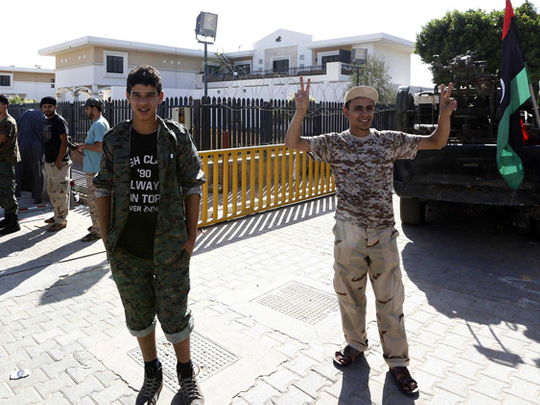
Cairo/Benghazi: Libya’s government said it has lost control of most ministries and state institutions located in Tripoli after rival armed groups took over the capital.
The interim government led by Prime Minister Abdullah Al Thinni, which resigned last week and has taken refuge in the east of the country, said armed groups were preventing government workers from entering their offices.
It said the interim government was in contact with officials and “trying to ensure the continuity of services from afar.”
Last month, senior officials and the elected parliament moved to the remote eastern city of Tobruk as an alliance of armed factions led by forces from the western city of Misrata took control of Tripoli, having expelled a rival group.
Libya is descending into anarchy as former rebels who helped topple Muammar Gaddafi in a Nato-backed uprising in 2011 have turned their guns on each other as they seek to set the country’s political agenda and control its vast oil reserves.
“We announce that most ministries, institutions and state bodies in the capital Tripoli are out of our control,” the government said in a statement late on Sunday. Armed groups had prevented staff from entering some government buildings, it added.
All ministries, the state-oil National Oil Corp (NOC) and central bank are located in the capital.
The interim government announced last week it had tendered its resignation to the elected parliament, days after a rival Islamist administration was created.
The persistent violence has not affected oil production but traders have said ownership of the oil might be subject to legal challenges if the Misrata forces take control of the central bank, where crude revenues are booked.
The new forces controlling Tripoli, some with Islamist leanings, have refuse to recognise the Tobruk House of Representatives, which has a strong liberal and federalist presence.
They have reconvened the previous parliament, the General National Congress, in which Islamists were strongly represented.
It last week named pro-Islamist figure Omar Al Hassi to form a “salvation government”.
Interim authorities have been steadily losing ground to the militias and the Fajr Libya (Libya Dawn) mainly Islamist alliance, which has seized Tripoli airport after weeks of fierce fighting with nationalist rivals.
On Sunday, Islamist militiamen moved into the US embassy compound in Tripoli that was evacuated in late July, with videos showing cheering men diving from an upstairs balcony into the facility’s swimming pool.
Western powers and Libya’s neighbours fear the North African country will turn into a failed state as the government lacks the backing of an army or police force to control the various armed groups.












